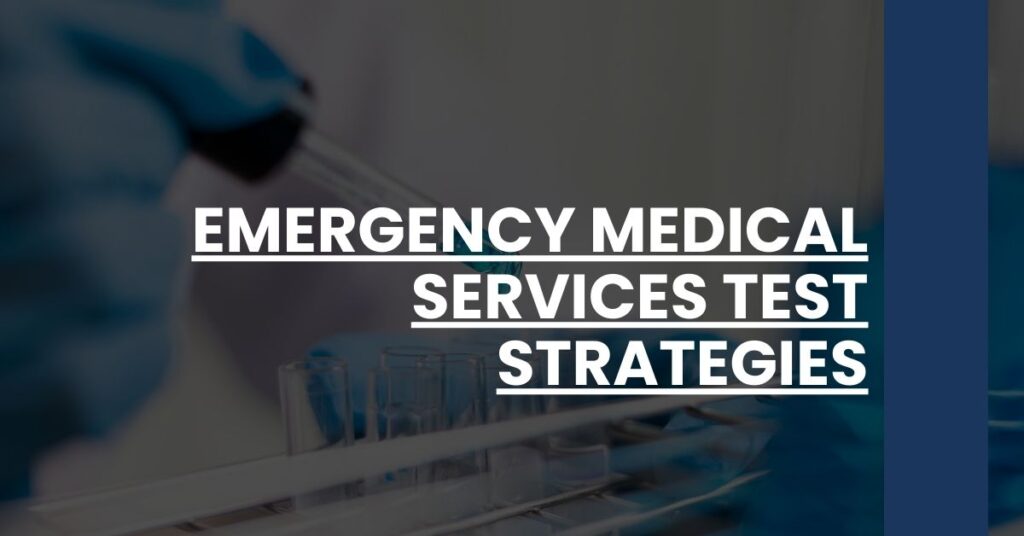Master Emergency Medical Services Test Strategies with these vital tips for preparation and execution.
- Streamlining Study Sessions: Efficiently cover EMS material for maximum retention.
- Practice Test Proficiency: Utilize simulation exams to boost performance in EMS testing scenarios.
- Stress Management Mastery: Learn techniques to stay calm and collected during your EMS exam.
Achieve excellence with these targeted Emergency Medical Services Test Strategies.
- Understanding the EMS Testing Landscape
- Reviewing Core Material Efficiently
- Utilizing Practice Tests
- Stress Management Techniques
- Time Management During Preparation
- Practical Skills Assessment Prep
- Leveraging Study Groups and Professional Networks
- Staying Updated with Current Protocols and Procedures
- Exam Day Strategies
- Incorporating Feedback and Continuous Improvement
- Conclusion: The Path Ahead
Understanding the EMS Testing Landscape
As you embark on your journey to conquer Emergency Medical Services (EMS) testing, you’re not just preparing for an exam; you’re gearing up for a vital role in life-saving care. The EMS testing landscape can be intricate, with various levels and types of tests designed to validate the breadth and depth of your knowledge and skills.
Types of EMS Tests
There are multiple tiers within EMS certifications, ranging from basic to advanced levels, including:
- Certified Emergency Medical Responder (EMR): Your first steps in EMS, focusing on immediate lifesaving care.
- Emergency Medical Technician (EMT): This is where you learn the core skills of EMS.
- Advanced-EMT (AEMT): At this tier, you’re diving deeper into more complex patient care.
- Paramedic License exams: The most advanced level, requiring a comprehensive understanding of all aspects of EMS.
Understanding the structure and requirements of these certifications is crucial. You’ll be tested on your ability to provide patient assessment, manage trauma care, and handle respiratory emergencies, to name a few.
Exam Content and Format
Your exams will assess a wide range of competencies, including practical skills and theoretical knowledge. You’ll face multiple-choice questions, scenario-based assessments, and psychomotor examinations, each designed to probe different facets of your Emergency medical services test strategies.
Realizing that these tests are not just about rote memorization but also about problem-solving and quick decision-making can shape your study approach. Treat each test type as a unique challenge and align your strategies to suit each one.
Certification Bodies
In the US, the National Registry of Emergency Medical Technicians (NREMT) is a key organization, offering a standardized measurement of the competencies required of EMS professionals. Taking the time to familiarize yourself with the NREMT’s methods and materials, including their role in EMS certifications, is time well spent.
Reviewing Core Material Efficiently
With the volume of information you need to master, efficiency isn’t just a buzzword—it’s your lifeline. Active learning principles and memory aids can revolutionize how you internalize EMS know-how.
Active Learning Vs. Passive Reviewing
learning involves engagement and practical application, and here’s how you can implement it:
- Self-explanation: Talk through the concepts out loud as if teaching someone else.
- Retrieval practice: Regularly test yourself to fortify your memory of the material.
- Distributed practice: Spread your study sessions over time to enhance long-term retention.
Mnemonics and Memory Aids
Memory aids, or mnemonics, turn complex information into memorable patterns or phrases. Here are some examples:
- Acronyms: Create acronyms from the first letters of a list you need to remember.
- Rhymes and songs: Set information to a melody or rhyme to make it stick.
- Pre-reading and pre-testing can also serve as effective pre-game strategies, priming your brain to absorb and retain information during more in-depth study sessions.
Utilizing Practice Tests
One of the more powerful weapons in your Emergency medical services test strategies arsenal is the practice test. Let’s hone in on why they’re essential and where to find them.
Familiarization with Format and Timing
By undertaking regular practice tests, you simulate the exam environment, which alleviates much of the mystery and anxiety surrounding the actual test. Being comfortable with the structure and typical timing of these tests can give you a critical edge.
Quality Practice Materials
Look for resources that provide comprehensive coverage of test sections and useful tools like sample answer sheets. Websites like Killeen Texas’s Fire Department offers templates and practice materials that can prove invaluable during your test prep.
Stress Management Techniques
The night before the exam isn’t the time to learn stress management—you’ll want these strategies to be second nature by then. Here’s how to cope with the pressure during your preparation and on the big day.
Before the Exam
- Regular Exercise: Engage in physical activities to reduce stress and improve mental clarity.
- Breathing Exercises: Practice deep breathing techniques to maintain calm.
During the Exam
- Mindfulness: Take moments of mindfulness to keep nerves in check.
- Realistic Positivity: Maintain a positive yet realistic outlook to boost confidence without inflating expectations.
Time Management During Preparation
Time management is less about clock-watching and more about structured efficiency. A well-crafted game plan can turn your prep from chaotic to coherent, ensuring you cover all the essentials without succumbing to burnout.
Creating Effective Study Schedules
- Assess Your Weaknesses: Tailor your schedule to spend more time on areas that need improvement.
- Set Achievable Goals: Break down your study material into manageable chunks and set clear objectives for each session.
- Be Consistent: Regular study sessions help build a routine and make learning a habit.
Balancing Study and Well-being
A marathon runner doesn’t sprint the entire race; likewise, pace your studies to avoid exhaustion. Allow time for breaks, social activities, and relaxation. This balance is key to maintaining motivation and focus over the long haul. Moreover, proper time management aids in acclimating to the time constraints of an exam—a crucial tactical advantage suggested by exam preparation experts.
Ensuring a structured, pressure-managed approach to your EMS test preparation will not only help you master the essential content but also build the stamina and mindset needed for success. Remember, when it comes to Emergency medical services test strategies, your greatest ally is a smart, informed approach to learning and practice.
Practical Skills Assessment Prep
When it comes to Emergency medical services test strategies, honing your practical skills is as critical as mastering the theoretical knowledge. The practical skills assessment portion of your EMS exam is designed to evaluate your ability to perform under pressure, just as you would in real-life scenarios.
Drill Down on Protocols
- Consistent Practice: Repeat essential procedures until they become second nature.
- Scenario Simulation: Engage in mock scenarios that simulate real emergency situations.
Solicit Constructive Feedback
- Peer Review: Work with classmates or colleagues to assess each other’s technique.
- Mentor Guidance: Seek advice from experienced EMS professionals who can offer insight and corrections.
For EMS providers, proficiency in practical skills is non-negotiable. Perfecting these through consistent, focused practice sessions will prepare you to confidently approach the hands-on components of your examination.
Leveraging Study Groups and Professional Networks
Building a support system is a pivotal aspect of your Emergency medical services test strategies—after all, EMS itself is a highly collaborative field. A study group or a professional network can offer a multitude of benefits for your exam preparation.
Advantages of Collaborative Study
- Shared Knowledge: Each member can offer unique insights and explanations.
- Increased Accountability: The group setting motivates you to keep up with your study plans.
- Diverse Perspectives: Discussing different viewpoints helps you to consider all angles of a problem.
Engaging with Your Network
- Attend Local Meetups: Interactions with peers in person can be incredibly valuable.
- Participate in Online Forums: Join discussions on platforms like Reddit or specialized EMS communities to exchange knowledge and resources.
By tapping into the collective wisdom of your study group and broader professional network, you gain access to resources and perspectives that can illuminate challenging concepts and enhance your understanding.
Staying Updated with Current Protocols and Procedures
As an EMS professional, keeping current with the latest protocols and procedures is not only beneficial for your career—it’s a matter of public safety. When preparing for your exams, being up-to-date is an indispensable part of your Emergency medical services test strategies.
Embrace Continuous Learning
- Attend Workshops and Seminars: Engage in ongoing education opportunities.
- Review Updated Literature: Regularly read current EMS journals and official guidelines.
Access Reliable Information
- Official EMS Websites: Resources like relevant government health websites are a treasure trove of up-to-date information.
- Medical Research Papers: Stay informed about new studies that may affect EMS best practices.
Exam Day Strategies
On the day of the EMS test, strategies that focus on logistical and mental preparedness are paramount. It’s about ensuring that all the hard work you’ve put into studying materializes into optimal performance when it matters most.
Logistical Readiness
- Know the Venue: Plan your route to the test center and arrive early.
- Prepare Test Materials: Organize all required materials (ID, writing instruments, etc.) the night before.
Mental Preparedness
- Visualization: Envision a successful test-taking experience to enhance confidence.
- Avoid Last-Minute Cramming: Trust the knowledge you’ve accumulated and stay relaxed.
These strategies, when implemented effectively, can make a substantial difference to your state of mind and set the stage for a smooth test experience.
Incorporating Feedback and Continuous Improvement
After every test, successful EMS providers view their performance through a lens that focuses on development and evolution. Take note of areas where you struggled and seek out feedback to transform weaknesses into strengths.
Using Feedback Constructively
- Self-Reflect: Dissociate emotionally and evaluate your performance objectively.
- Consult Your Mentors: Their experience can provide tailored advice for improvement.
Cultivating a Growth Mindset
- Embrace Challenges: Use difficult experiences as fuel for personal and professional growth.
- Celebrate Progress: Acknowledge the advancements you’ve made in your mastery of EMS.
Conclusion: The Path Ahead
As you progress along your path in Emergency medical services, test strategies will evolve to meet the demands of an ever-changing field. The techniques and insights shared here are designed to equip you with an adaptable framework that can guide your study habits, your practical skill development, and your mindset.
Within the pressure-cooker environment of EMS examinations, your success won’t be solely determined by the knowledge you’ve accumulated but by your ability to apply that information effectively and efficiently. The strategies you’ve learned today are not just test-taking tips; they’re foundational elements of a robust, lifelong journey in emergency medical care. Your commitment to excellence in your exam prep mirrors the dedicated approach you’ll bring to your future patients, ensuring you’re ready for whatever challenges lie ahead.
Remember, mastering Emergency medical services test strategies is about more than passing an exam—it’s about setting the stage for a fulfilling and successful career in EMS. Go forth with the confidence that comes from preparation and the knowledge that you are equipped to make a significant impact on the lives of those you’ll serve.

